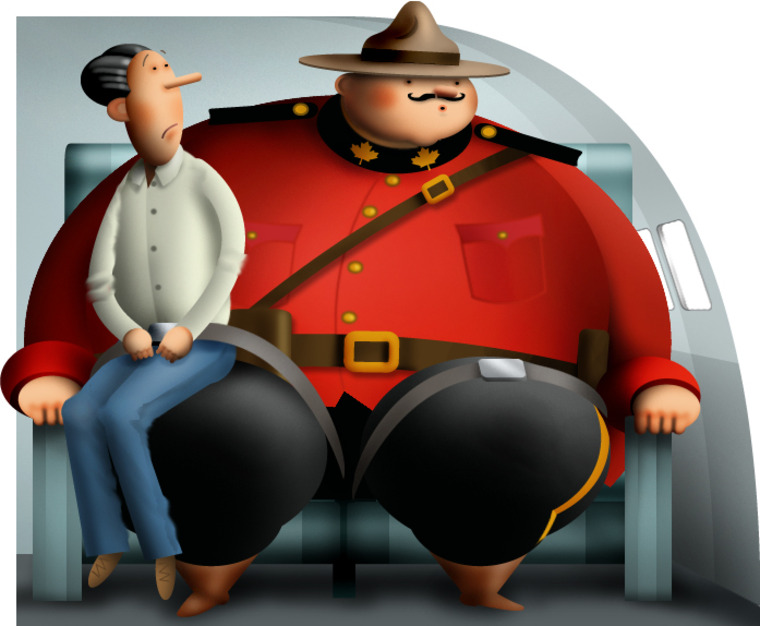“You’ve dawdled this whole year. Now stop all that bellyaching and get on with it.”
That, in essence, is the message Canada’s Supreme Court gave the country’s major airlines late last month. Now, after spending a year trying to weasel out of it with repeated court appeals, Canadian airlines are scrambling to figure out how to meet the January 10th deadline for complying with “one-person, one-fare” policy mandated by the Canadian Transportation Agency (CTA). It is groundbreaking legislation some hope — and others fear — may spread to the United States and beyond.
So pay attention.
Under the new rules, applying only to domestic flights, Air Canada, Air Canada Jazz and WestJet cannot charge more than one fare to persons with disabilities who cannot fly without the help of an attendant.
Few people will take issue with that.
What some folks are taking issue with, however, is the part of the ruling that also promises a complimentary second seat to passengers who are “determined to be functionally disabled by obesity.”
But what exactly does that mean? After spending a few hours chewing the fat about the meaning of this phrase with travelers, obesity experts, airlines representatives and others, one thing is clear: Nothing is clear. Especially, when it comes down to passengers seated — or trying to get seated — on an airplane.
‘Uncharted territory’
“No other country in the world has told airlines to do this,” WestJet spokesman Robert Palmer said. “We’re in uncharted territory here. We know how to run an airline. But we’re not experts on at what point obesity becomes a disability.”
Yet, come January 10th, Canadian airlines will be expected to have it figured out.
They’ll have to hurry.
Last year when it first issued the ruling, CTA offered to facilitate a collaborative process to help the airlines work out a way to implement the new policy. CTA spokesperson Marc Comeau says only WestJet has met with the agency about a potential proposed screening proposal. But while all the airlines spent a lot of time, energy and money trying to stop the process through the courts, “the clock kept ticking.”
Now, like students who have been avoiding that big final paper, the airlines are in cramming mode.
How are they doing? Air Canada’s Peter Fitzpatrick sent this curt e-mail: “At this point we have nothing to say on this matter other than that we intend to comply with the new regulation.” WestJet spokesperson Robert Palmer said the airline was “putting its nose to the grindstone,” and meeting with disability rights groups to get input on a plan. “We’re seeking advice and feedback, looking at research and, of course, we have some ideas of our own,” he said.
Experts weigh in
Since that clock is ticking loudly, and because “seatmates of size” is a hot topic, we thought the airlines might want to crib some ideas from a few outside experts.
Robert Jarvis, a law professor with a specialty in aviation at the Nova Southeastern University Law Center in Fort Lauderdale, Fla., laid out four possible policies, and conveniently pre-graded them for difficulty:
- Easy: A traveler would simply self-declare as obese and receive an extra seat;
- Moderate: A doctor would give a traveler a note declaring the traveler to be obese;
- Difficult: A traveler would need a doctor’s note and meet an objective standard (such as the Body-Mass Index), which would require an in-person measurement either on the day of travel or, within 30 days before the day of travel;
- Hard: A traveler would need to take a physical exam from a doctor of the airline's choosing.
“Obviously, option 1 is subject to abuse,” Jarvis admitted. “In a tight economy, even thin people might declare themselves to be obese to save money.” And he thinks option 4 would be subject to “consumer backlash and the possibility of invasion-of-privacy lawsuits.” So he expects the airlines will begin with option 2 and move to option 3.
Other experts would mix and match the Jarvis options. Adam Drewnowski, director of the University of Washington’s Center for Obesity Research in Seattle, suggests that the extra seats be made available to travelers who bring a doctor’s letter and who have a BMI (Body Mass Index) of 35 or above. (BMI is a measure of body fat based on height and weight. A BMI of 18.5 to 24.9 is considered average.) “A BMI of 25 is considered overweight. A BMI of 30 is obese. A BMI of 35 is medically significant obesity. There can be no argument,” Drewnowski said.
But Dr. Arya M. Sharma disagrees. “You can’t bring it down to a BMI. People’s body shapes are different.” Instead, the chair of obesity research at the University of Alberta suggests a solution inspired by the baggage sizers already in place at many airports. Instead, Sharma would like airlines to place an airplane seat in the terminal — “somewhere that offers travelers a bit of privacy.” Then, if it’s not obvious that a traveler won’t fit in one seat, they can sit in the sample seat. “If they don’t fit in the seat, then they’re too big and they’ll need to have that extra seat. At no cost. It’s not rocket science.”
Peggy Howell of the National Association to Advance Fat Acceptance isn’t so sure that plan meets the spirit of the “one-person, one-fare” policy. “This shouldn’t mean that every fat person should get a free seat just because they’re fat. If you look at the ruling it says the extra seats are for people ‘determined to be functionally disabled by obesity.’ And fat does not necessarily equal disabled.”
She offers a different, even simpler solution: Option 5 — bigger seats for everyone.
That’s not rocket science either.
Harriet Baskas writes msnbc.com's popular weekly column, The Well-Mannered Traveler. She is the author of the , a contributor to National Public Radio and a columnist for USATODAY.com.
